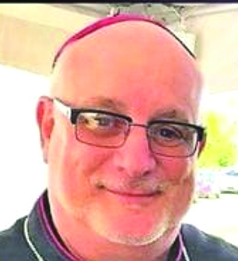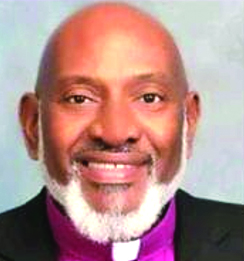
27th Sunday in OT (B)
September 28, 2021
Sign this petition to help protect our world & our common home
September 28, 2021ANTIGUA
Bishop Robert Llanos of St John’s-Basseterre is countering the banter that the Covid-19 vaccine is the “mark of the beast”. He maintains that the passage in the Book of Revelations has “no reference” whatsoever to today’s world of the coronavirus pandemic.
Bishop Llanos explained that the passage (Revelations 13), “exclusively” refers to what was going on at the time when St John the Evangelist wrote the Book—the suffering and persecution of Christians and Jews.
According to the Bishop, the Book of Revelations was written somewhere between June 9, 68 AD and January 15, 69 AD.
He said that while other parts of Revelations speak to future prophecies/events, the 666 mark of the beast refers to Roman Emperor Nero Caesar of that time.
“When you add up the letters in the Hebrew and Aramaic language, it totals 666…” he said.
Bishop Llanos of the Catholic Church was among the panellists, which comprised faith representatives from the Methodist and Pentecostal churches on ABS Television/Radio, Tuesday, September 21 to share the Church’s perspective on the pandemic and the vaccines.
Bishop Llanos outlined that he has never heard any of his Catholic parishioners refer to the mark of the beast as a reason for not taking the vaccine.
“I would say that particular notion is very rare among Catholics,” the bishop said.
He however, mentioned that their trepidation over taking the vaccines is more to do with the science of it and “a lot of the stuff that is on social media that puts doubts in their minds about the vaccine from a scientific point of view, and a health point of view.”
Asked to share their thoughts of whether the pandemic is part of prophecy, Bishop Everald Galbraith of the Methodist Church agreed “to some extent” while Apostle Stephen Andrews of the Pentecostal faith responded, “this is where we are presently based on what scripture is telling us.”
Bishop Llanos first acknowledged this is not the first pandemic the world has experienced. He continued that whether it is a fulfilment of prophecy or not, no one can categorically say when the end times will be.
“But what we do know is that perilous times are always occasions when the world is called to look at itself more closely and more carefully, to take cognisance of the kind of world we are living in when we are in perilous times. So, it’s an opportunity to think things over and to take a new approach to things, to do some introspection and some self-analysis, not just individual self, but all the institutions of the world….”
He continued, “And for me, that’s the value of the perilous times. Perilous times are times where we suffer a lot, we face hardships, times where we cry out to God for help and healing, for restoration, deliverance… the perilous times have to move us to catharsis, a kind of rethinking how we are living our lives in the world and whether we want to continue living our lives the same way or whether we need to change a lot of things for the better of humanity….” Bishop Llanos said.
Responding to the question of how Covid-19 has changed the way their respective Church operates, Bishop Llanos said that since the pandemic, the Church has discontinued drinking from the chalice and giving communion on the tongue.
However, for the Methodist faith, Bishop Galbraith shared that since the pandemic, faithful were required to use different “instruments” to distribute communion.
He said while aspects of the faith shifted online, from Bible study to Mass, there have been advantages. He mentioned that given the nature of the Methodist Church, travel is a major part of its activities. “And so being able to meet, sitting down in Antigua and conduct an entire meeting for the Americas was a great blessing to the church financially,” he said.
As it relates to Communion, Apostle Andrews shared that the Church has implemented the use of disposable cups “which of course is more expensive”.
While the faith leaders all confirmed that the Church’s collection has “taken a hit” Bishop Llanos said that there have been faithful parishioners who continue to give as much as they can.
However, this has not slowed down the Church’s ongoing efforts to provide for those in need. He identified several ministries within the Church such as the Society of St Vincent de Paul, a youth group ministry, parishes, and food banks that continue to provide for families “as usual”.











